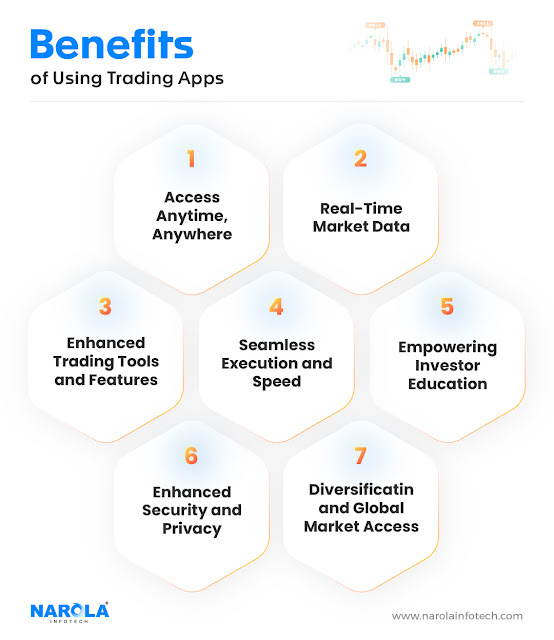In the past, trading in the stock market was reserved for a select few who had access to the right information and could afford the high fees of traditional brokers. However, the rise of trading apps has made it possible for anyone with a smartphone to trade stocks and other securities from anywhere in the world.
In this blog, we'll be discussing the benefits
of using a trading app.
Benefits of Using a Trading App
Convenience
One of the most obvious benefits of using a trading
app is the convenience it offers. With a trading app, you can buy and sell
stocks at any time of the day, from anywhere in the world.
You don't have to visit a broker's office or call
them up to place an order. Instead, you can simply log in to your trading app
and execute trades with just a few clicks.
Lower Fees
Another major benefit of using a trading app is the
lower fees. Traditional brokers often charge high fees for their services,
which can eat into your profits.
Trading apps, on the other hand, offer much lower
fees. Some trading apps even offer commission-free trading. That means you can
trade stocks without paying any fees at all.
User-Friendly Interface
Most trading apps have a user-friendly interface
that makes it easy for beginners to start trading. They offer features like
real-time stock quotes, news updates, and market analysis tools that help you
make informed decisions.
You don't need to be an expert to use a trading
app, as the interface is designed to be intuitive and easy to use.
Access to a Wide Range of Securities
Trading apps offer access to a wide range of
securities, including stocks, ETFs, and cryptocurrencies. This means you can
diversify your portfolio and invest in different types of securities to spread
your risk.
You can also invest in securities from different
markets around the world. That would allow you to take advantage of global
trends and opportunities.
Real-Time Trading and Market Data
Trading
apps offer real-time trading and market data. That means you can stay
up-to-date with the latest market trends and news. This information is crucial
when making investment decisions. It allows you to react quickly to changes in
the market.
With a trading app, you can access real-time
quotes, charts, and news updates from anywhere in the world.
Control Over Your Investments
Using a trading app gives you complete control over
your investments. You can monitor your portfolio, track your profits and
losses, and make adjustments to your investments as needed.
This level of control is important for investors
who want to take an active role in managing their investments.
Automated Investing
Some trading apps offer automated investing
features that allow you to set up a portfolio based on your investment goals
and risk tolerance. The app will then automatically invest your money in a
diversified portfolio of securities, based on your preferences.
This is a great option for investors who don't have
the time or expertise to manage their investments actively.
Conclusion
In conclusion, using a trading app offers several
benefits. If you're interested in investing in the stock market, a trading app
may be a great option for you.
With the right app and a sound investment strategy,
you can make smart investment decisions and potentially earn significant
returns on your investments.
Read More
Buy
Now Pay Later: A Comprehensive Guide for 2023
How
to Make a Payment Gateway Software: A Step-by-Step Guide

Comments
Post a Comment